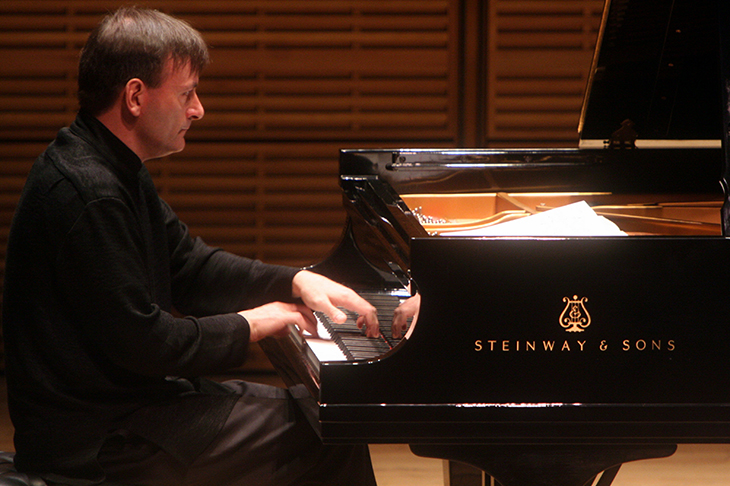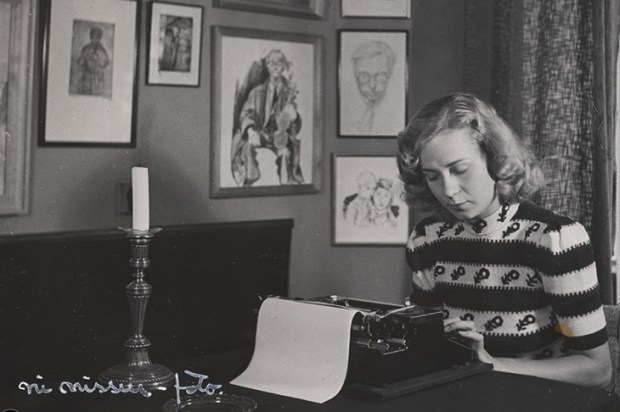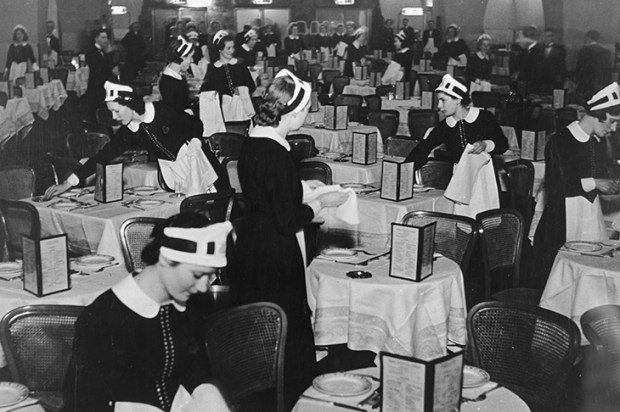Novelist, essayist, painter, poet, composer. Oh yes, and pianist: Stephen Hough does all of these things very well — and one of them superlatively.
Most of us will know Hough as a dazzling but thoughtful concert pianist, at home with almost all repertoire, but with a special affinity for 19th- and early 20th- century works. He recently played a gilded royal piano at the Proms — and before that published his first extended work of fiction. But don’t call him a Renaissance man. He flinches — and points out he’s not much cop at maths or science. That makes the rest of us feel only marginally better.
A pianist has to do something while on the road — all those flights and lonely nights in distant hotel bedrooms. Once you’ve mastered the notes and feel secure about the performances ahead, how to fill the time? Answer: write another book.
Rough Ideas has the feeling of a work written in snatches. It’s highly episodic, with entries ranging from a few dozen words to a few hundred. Many of them begin with questions — the sort of things he’s repeatedly asked, one guesses, by adoring audiences and sponsors over post-concert drinks and nibbles before packing his bag to move on to the next venue. (Pianists develop an ‘almost monastic discipline of indifference’ to cope with ‘this seesawing of emotional attachment and detachment’ while on tour, he says.)
Is classical music for everyone? Can you be a musician and not write music? Do special clothes make a difference while performing? Is there too much music? What kind of piano do you have at home? Should orchestras use vibrato? Can we clap between movements? Where do you sit to play the piano? Can atonal music make you cry? Do musicians tend to be socialists? And so on.
But if the questions are sometimes routine, the answers are like Hough’s playing: original, fresh, deeply considered, personal. And sometimes quirky or contrarian. We know the 10,000-hour rule to prepare for genius. But Hough shows it helps to have genius as well.
So is classical music for everyone? In theory yes, especially if universally introduced to children early on, which this country appears, for the moment, to have given up on. But Hough is not too fussed by the sea of grey and white hair in most western concert halls: it often takes time to grow into classical music.
Should pianists listen to recordings? Not as a general rule: they can limit a student’s horizons. Are concerts at the right time? Perhaps not. Why not remove the interval and start either earlier or later: ‘80 minutes of music, then out.’
Hough is a encyclopaedic historian of pianos, piano music and pianists. There’s an eloquent account of the fall (and rise?) of the Bechstein. He knows every recorded note of Alfred Cortot, Ignaz Friedman, Sergei Rachmaninov and Artur Schnabel. He reveres the inspiration of Dame Myra Hess and the quiet introspection of Vlado Perlemuter: he celebrates the way Josef Hofmann reinvented the sound of the Steinway. Brahms’s first or second piano concertos? ‘The second is the better piece, but the first is the greater piece.’ The book is full of such aphorisms.
He readily admits he doesn’t really ‘get’ Bach, in the way he gets Mompou. (‘The lack of mess. Or the lack of irresolution. Or the lack of self-doubt — although maybe I’m wrong about that.’) If you lazily bracket Debussy and Ravel together you’re wrong: they’re chalk and cheese (‘two French birds that simply do not sing on the same branch’).
He has come to terms with modernism because
in the free-flowing 21st century, I’m able to choose it, and to play with it, and then leave it, and then take it up again. Its challenge to the status quo or to comfortable conservatism is ever relevant and refreshing — until it begins to enforce its own rigidity.
But, when all is said and done, he believes in tonality (‘part of the internal swing of pleasure and pain mirroring that of our lives’).
Here he expands on why he objects to some contemporary music:
For me, great music should be able to be ‘heard’ after it’s stopped sounding. The vibrations that were created in the air of the concert hall or on the recording must be ‘cherishable’. When we listen to music we want some element of the piece to become a part of us. It is like reading a book. If we close the pages and nothing at all remains of what we’ve been reading, it is not unreasonable to suggest that we’ve been wasting our time. Ultimately if we cannot take away an aura from music, however complex the piece or indefinable the emanation, I don’t think the music is really worth anything.
There are some frustratingly under-explored questions. While Hough dips into whether music is ‘moral’ (and whether bad people can be great artists), he does not help us in thinking about the flaws in his hero, Cortot — a sublime pianist who, at the very least, collaborated with the Nazis in Vichy France. But, in general, this is a delightful rattle bag of musings, borne out of deep immersion in his craft. There are also sections on his relationship with Catholicism (‘I am a Christian by conviction, with roots deep in Judaism’). His love of Chopin, Liszt and Rachmaninov shines through and, though these are, essentially, notebooks, they are full of provocations.
If you’ve always loved the second and third Rachmaninov concertos, for example, prepare to be challenged into thinking anew about the much less treasured fourth:
It is heart-wrenching and painful: a view of the lonely, exiled composer backstage under the harsh lights of his dressing room, rather than bathed in the footlights of the auditorium. It is the most ‘modern-sounding’ of his works, the least played, the least known, the least loved — except for a few who, like me, love it the most. The final 1941 version, tight as a drum, is a unique, original, 20th-century masterpiece.
I’m now off to rethink these works and listen with different ears. A book that can do that a dozen or more times is not a bad achievement.
Got something to add? Join the discussion and comment below.
Get 10 issues for just $10
Subscribe to The Spectator Australia today for the next 10 magazine issues, plus full online access, for just $10.
You might disagree with half of it, but you’ll enjoy reading all of it. Try your first month for free, then just $2 a week for the remainder of your first year.














Comments
Don't miss out
Join the conversation with other Spectator Australia readers. Subscribe to leave a comment.
SUBSCRIBEAlready a subscriber? Log in